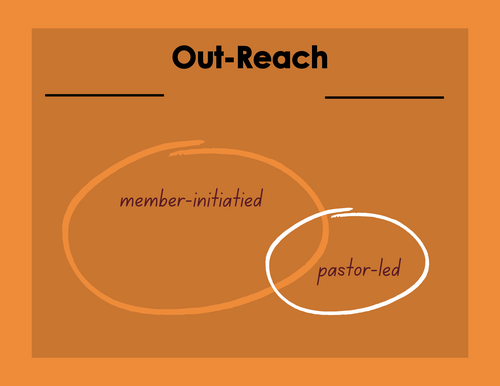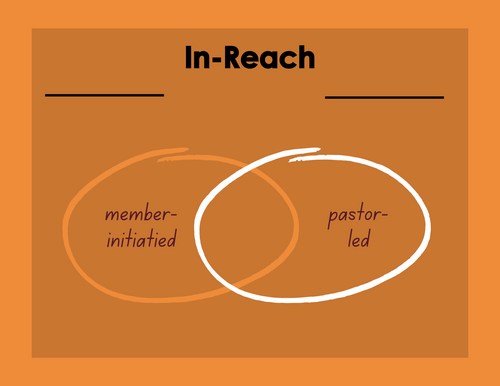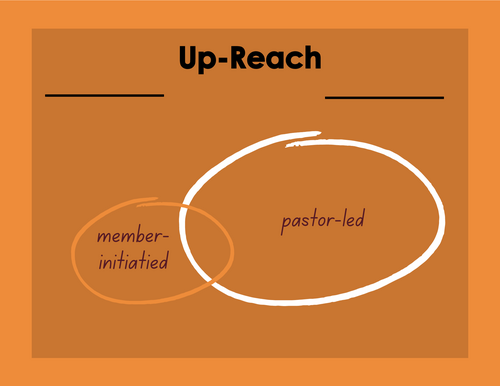The Regulated Free Market Ministry
Economics 101
The concept of a “regulated free market” approach to ministry comes from Jamie Dunlop. The idea builds on the economic system where goods and services are developed and sold in accord to supply and demand. Have a valuable good or needed service? That assessment will be confirmed by demand. If no one wants to buy what you’re selling, either it isn’t needed or the concept needs more work. However, this is not an entirely laissez faire economy. There are regulatory guardrails and laws that restrict or promote certain goods and services. For example, the free market may want cocaine but such a product is regulated. Alternatively, subsidies are provided to encourage certain agricultural production.

The biblical underpinnings of applying this approach to ministry is the clear instruction that church members are the ones responsible to do the work of the ministry. Pastors and other leaders are gifts to the church for equipping members for that work (Ephesians 4:12). That does not mean pastors or church staff merely develop programs for members to fill the volunteer ranks. Instead, members must walk in the good works God has prepared beforehand for them (Ephesians 2:10), being filled with the Spirit (Ephesians 5:18), working properly so that the Body grows up in love (Ephesians 4:16).
This approach not only more squarely places the responsibility for the ministry of the church on members, it keeps the church more nimble, adaptable, and reproducible.
This approach not only more squarely places the responsibility for the ministry of the church on members, it keeps the church more nimble, adaptable, and reproducible.
- We are nimble because we haven’t committed ourselves to programmatic investment requiring mass volunteer recruitment.
- We are adaptable because if a ministry initiative isn’t working, we can let it end rather than propping it up as a “legacy ministry” carried on simply because “it’s what we’ve always done.
- And we are reproducible because our minimal programmatic commitments can be imitated by revitalized or newly planted churches more readily than a robust array of ministry offerings typical of longer established churches.
Our Regulating Principles
When it comes to any ministry initiative at Westview, Scripture is our primary regulating guide when considering what we give our time, energy, and resources to. We ought to give priority to those things Scripture prioritizes and refrain from doing that which Scripture would prohibit.
Secondarily, any ministry initiatives should align with our affirmations of faith and be characterized by our essentials of gospel growth, joyful mission, and generous hospitality. An evaluative question should be, “Is this ministry idea inconsistent with either the Member or Elder Affirmation of Faith?” Similarly we ought to ask, “How can this ministry idea be flavored with our essentials?”
But how might a member of Westview know where there is freedom to run with an idea or if pastoral leadership and oversight is necessary? Or to use the free market analogy, what "industries" will be regulated? The categories of out-reach, in-reach, and up-reach provide a framework.
Secondarily, any ministry initiatives should align with our affirmations of faith and be characterized by our essentials of gospel growth, joyful mission, and generous hospitality. An evaluative question should be, “Is this ministry idea inconsistent with either the Member or Elder Affirmation of Faith?” Similarly we ought to ask, “How can this ministry idea be flavored with our essentials?”
But how might a member of Westview know where there is freedom to run with an idea or if pastoral leadership and oversight is necessary? Or to use the free market analogy, what "industries" will be regulated? The categories of out-reach, in-reach, and up-reach provide a framework.
Out-reach (Evangelistic)
Initiatives that fit in this category are oriented towards engaging those currently not following Christ in all of life and outside the membership of the church. These endeavors are going to see more freedom for members to act on independently. If a member needs help to grow in her ability to meet a need, needs the initiative communicated broadly to the church, or requires finances from the church to carry it out, the pastors’ role is to equip for such ministry and provide the needed coaching.

In-reach (Member Care)
Given the “one another” commands placed on church members and the acall for pastors to shepherd the Flock by exercising oversight (1 Peter 5:2), there is going to be more of a blend of members’ initiative and pastors’ oversight in ministry ideas related to activity within the church. Pastors will need to play a more active role in vetting, assessing, equipping, and mobilizing for these ministries.

Up-reach (Discipleship Structures)
When it comes to the formal discipleship structures of the church that we are committed to, the pastors will take the lead in initiating and overseeing. This relates to public worship, Community Groups, Discipleship Groups, Discipleship Classes, and leader development.

Getting Started
The initial step for requesting assistance for out-reach initiatives or pastoral review for in-reach or up-reach endeavors is to complete this online form.
This approach to ministry is less complicated, but it is harder. A programmatic approach is more complicated, but it is easier. A "regulated free market" approach to ministry is more decentralized and more directly carried out by the members of the church, but it does require more of us. It may be clunkier and less efficient at times, but we think it better mobilizes us as a church to engage in the mission Christ has commissioned us to.
